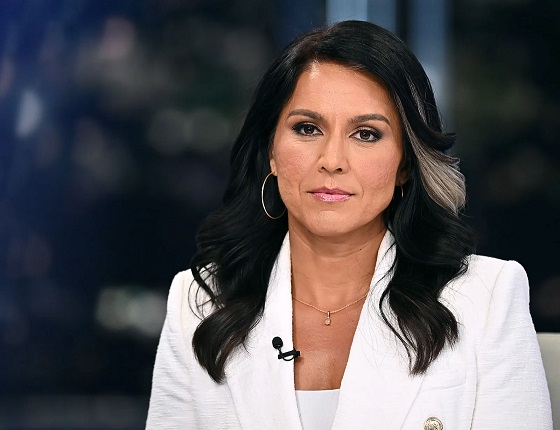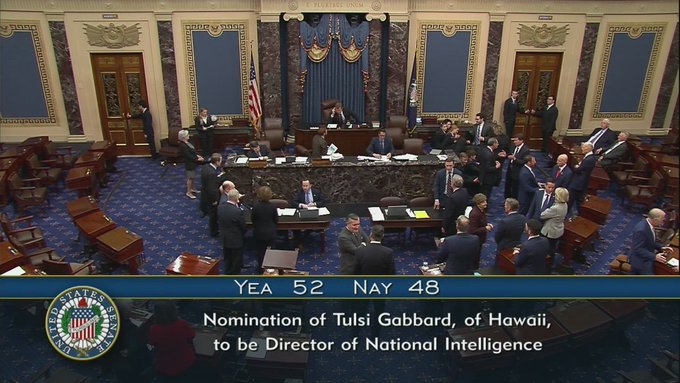espionage
Tulsi Gabbard confirmed as Trump’s Director of National Intelligence

Quick Hit:
The Senate on Wednesday confirmed former Democrat congresswoman Tulsi Gabbard as President Donald Trump’s director of national intelligence. The vote, which passed mostly along party lines at 52-48, followed weeks of intense debate over Gabbard’s past views on intelligence operations and foreign policy.


Key Details:
-
Gabbard, who represented Hawaii in Congress for eight years, faced sharp scrutiny from both parties over her past comments on U.S. adversaries, surveillance programs, and her stance on Edward Snowden.
-
Senate Intelligence Committee Republicans approved her nomination last week after she provided follow-up answers addressing their concerns. Some GOP lawmakers had initially resisted, citing worries over her foreign policy positions.
-
Senate Minority Leader Chuck Schumer opposed the confirmation, claiming that Gabbard “wouldn’t receive more than ten votes” if Republicans were allowed to vote in secret.
Diving Deeper:
Tulsi Gabbard, a former Democrat congresswoman from Hawaii turned Trump ally, was confirmed Wednesday as the director of national intelligence following a 52-48 Senate vote that split mostly along party lines. Former GOP Senate Leader Mitch McConnell was the only Republican to join all Democrats in voting against Gabbard, and the confirmation marks one of President Trump’s most controversial intelligence appointments, with Gabbard facing intense questioning over her positions on classified intelligence and foreign adversaries.
Gabbard’s past remarks and actions drew bipartisan concern, particularly her defense of Edward Snowden, her prior skepticism of U.S. intelligence assessments on Syria’s Bashar al-Assad, and her opposition to surveillance authorities like Section 702. Senate Intelligence Committee Republicans had initially hesitated on her nomination, but they ultimately backed her after she responded to follow-up inquiries about her positions on national security.
Virginia Sen. Mark Warner, the ranking Democrat on the Intelligence Committee, claimed that Gabbard was unfit for the role, accusing her of “publicly defending Snowden after he compromised our nation’s most sensitive collection sources and methods.” Warner also criticized her past statements blaming the U.S. and NATO for Russia’s invasion of Ukraine and her meeting with a controversial Syrian cleric.
During confirmation hearings, Gabbard refuted accusations that she harbored sympathies for foreign adversaries, calling the allegations “offensive.” She defended her record on national security and insisted that while she disagreed with Snowden’s actions, her proposed intelligence reforms would prevent similar leaks in the future.
Senate Republicans ultimately rallied behind Gabbard, with Senate Republican Whip John Barrasso pushing back on accusations that she had echoed Kremlin propaganda. He pointed to her past support for sanctions against Russia and Iran, as well as her backing of military aid to Ukraine after Russia’s 2014 annexation of Crimea.
Schumer and other Senate Democrats urged Republicans to resist pressure from the Trump administration, claiming that GOP lawmakers were putting politics ahead of national security. Despite these objections, the confirmation moved forward, concluding a bitterly divided debate over Gabbard’s appointment to lead the nation’s intelligence operations.
conflict
Iran nuclear talks were ‘coordinated deception’ between US and Israel: report

From LifeSiteNews
Reports state that U.S. peace talks were a ruse and that Trump gave Netanyahu a ‘green light’ to hit Iran’s nuclear and military sites, killing top commanders.
A senior Israeli official told the Jerusalem Post that Tel Aviv and Washington worked together to convince Tehran that diplomacy was still possible after Israel was ready to attack Iran. Just hours before Israel’s massive assault began, President Donald Trump maintained he was still committed to talks.
The Israeli outlet reports, “The round of U.S.-Iranian nuclear negotiations scheduled for Sunday was part of a coordinated U.S.-Israeli deception aimed at lowering Iran’s guard ahead of Friday’s attack.”
READ: Israel strikes Iran’s nuclear sites, kills top commanders in massive air assault
In a post on Truth Social shortly before the Israeli strikes began, Trump declared that “We remain committed to a Diplomatic Resolution to the Iran Nuclear Issue! My entire Administration has been directed to negotiate with Iran. They could be a Great Country, but they first must completely give up hopes of obtaining a Nuclear Weapon. Thank you for your attention to this matter!”
After the Israeli attack was in progress, Secretary of State Marco Rubio denied that the U.S. was involved. However, American officials have said the White House was aware Israel was set to begin striking Iran, with Trump telling Fox News he was briefed on the operation.
Barak Ravid of Axios, moreover, later reported that Tel Aviv was given “a clear U.S. green light” to start bombing, citing two unnamed Israeli officials.
Sources speaking with Axios said the perceived split between Trump and Israeli Prime Minister Benjamin Netanyahu was coordinated behind the scenes. “Two Israeli officials claimed to Axios that Trump and his aides were only pretending to oppose an Israeli attack in public – and didn’t express opposition in private,” the report explained. “The goal, they say, was to convince Iran that no attack was imminent and make sure Iranians on Israel’s target list wouldn’t move to new locations.”
The sources said that Trump and Netanyahu discussed the attack during a phone call on Monday. After the call, reports said Trump pressed Netanyahu not to attack Iran, but that was another effort to deceive Iran.
In a second post following the attack, Trump said he gave Iran the opportunity to make a deal, and suggested that Israel used American weapons in the massive air raid. “I gave Iran chance after chance to make a deal. I told them, in the strongest of words, to ‘just do it,’ but no matter how hard they tried, no matter how close they got, they just couldn’t get it done,” the president wrote.
The post continued, “I told them it would be much worse than anything they know, anticipated, or were told, that the United States makes the best and most lethal military equipment anywhere in the World, BY FAR, and that Israel has a lot of it, with much more to come – And they know how to use it.”
The U.S. and Iran began negotiations on establishing a new nuclear agreement in April, with the two sides engaging in five rounds of Omani-mediated talks. At times, a deal appeared possible, with Iranian officials saying the dialogue was leading to progress. A sixth round of talks was scheduled for Sunday, but now appears unlikely.
A second source speaking with the Jerusalem Post said the goal of Israel’s military operations was not the complete destruction of Iran’s nuclear facilities, but rather to hit missile sites and top Iranian leaders to bring down the government.
Israel has conducted several rounds of strikes so far, hitting nuclear facilities, residential buildings in Tehran, and military sites. Iran has confirmed that several military leaders and nuclear scientists were killed in the bombing.
espionage
FBI Director: CCP Behind Wave of Pathogen Smuggling as Third Chinese Student Charged in Michigan Lab Probe

 Sam Cooper
Sam Cooper
“In a follow up interview with FBI and ICE HSI agents, Han admitted to sending the packages and lying about their contents”
In an intensifying pattern of national security investigations targeting unauthorized biological shipments from China into Detroit, U.S. authorities on Monday confirmed the arrest of a third Chinese national allegedly involved in smuggling undeclared bio-materials into the United States—this time for use at a University of Michigan laboratory.
“This case is part of a broader effort from the FBI and our federal partners to heavily crack down on similar pathogen smuggling operations, as the Chinese Communist Party works relentlessly to undermine America’s research institutions,” FBI Director Kash Patel posted to X on Monday evening.
The latest defendant, Chengxuan Han, is a citizen of the People’s Republic of China and a doctoral student at the College of Life Science and Technology in Wuhan. She has been charged with smuggling goods into the U.S. and making false statements, according to a federal criminal complaint filed in U.S. District Court in Detroit.
From September 2024 through March 2025, prosecutors allege, Han sent four international shipments containing concealed biological materials to individuals affiliated with a University of Michigan lab. The contents were identified as Caenorhabditis elegans — roundworms commonly used in genetic and biomedical research. The packages were mis-manifested and not declared in accordance with U.S. import regulations.
On June 8, Han arrived at Detroit Metropolitan Airport on a J-1 visa and was stopped by U.S. Customs and Border Protection officers. She allegedly denied having sent any biological materials to the U.S. and made false statements about the nature of the shipments. Agents also discovered that content on her electronic device had been deleted three days before her arrival — a detail included in the federal complaint.
“In a follow up interview with FBI and ICE HSI agents, Han admitted to sending the packages and lying about their contents,” Patel commented.
“The alleged smuggling of biological materials by this alien from a science and technology university in Wuhan, China — to be used at a University of Michigan laboratory — is part of an alarming pattern that threatens our security,” said U.S. Attorney Jerome F. Gorgon, Jr. “The American taxpayer should not be underwriting a PRC-based smuggling operation at one of our crucial public institutions.”
The case marks the third time in one week that Chinese nationals connected to the University of Michigan have been charged with allegedly smuggling undeclared biological material from China into the U.S. for laboratory research.
On June 3, federal prosecutors charged Yunqing Jian, 33, a postdoctoral fellow at the University of Michigan, and her boyfriend, Zunyong Liu, 34, with conspiracy, smuggling goods into the U.S., false statements, and visa fraud. Jian and Liu are accused of importing Fusarium graminearum — a fungus considered in some scientific literature to be a potential agroterrorism threat — into the country without proper declaration.
Officials allege Liu, who conducts research on the same pathogen at a university in China, initially lied to investigators but later admitted to smuggling the fungus for research in Jian’s Michigan lab.
The Bureau is a reader-supported publication.
To receive new posts and support my work, consider becoming a free or paid subscriber.
-

 Health6 hours ago
Health6 hours agoLast day and last chance to win this dream home! Support the 2025 Red Deer Hospital Lottery before midnight!
-

 Business1 day ago
Business1 day agoCarney’s European pivot could quietly reshape Canada’s sovereignty
-

 Crime2 days ago
Crime2 days agoManhunt on for suspect in shooting deaths of Minnesota House speaker, husband
-

 Alberta1 day ago
Alberta1 day agoAlberta’s grand bargain with Canada includes a new pipeline to Prince Rupert
-

 Aristotle Foundation9 hours ago
Aristotle Foundation9 hours agoThe Canadian Medical Association’s inexplicable stance on pediatric gender medicine
-

 conflict12 hours ago
conflict12 hours ago“Evacuate”: Netanyahu Warns Tehran as Israel Expands Strikes on Iran’s Military Command
-

 Energy12 hours ago
Energy12 hours agoCould the G7 Summit in Alberta be a historic moment for Canadian energy?
-

 Bruce Dowbiggin11 hours ago
Bruce Dowbiggin11 hours agoWOKE NBA Stars Seems Natural For CDN Advertisers. Why Won’t They Bite?






